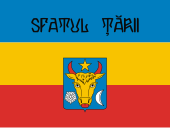Sfatul Ţării
|
The National Council of Moldova Sfatul Țării |
|
|---|---|
 |
|
| Type | |
| Type | |
| Leadership | |
| Seats | 150 |
| Elections | |
|
Last election
|
1917 |
| Meeting place | |
| Sfatul Țării Palace, Chișinău | |
| Romanian invasion of Bessarabia | |||||||||
|---|---|---|---|---|---|---|---|---|---|
| Part of the Romanian Campaign of World War I | |||||||||
|
|||||||||
| Belligerents | |||||||||
|
|
|
||||||||
| Commanders and leaders | |||||||||
|
|
|
||||||||
| Strength | |||||||||
| Unknown | Unknown | ||||||||
| Casualties and losses | |||||||||
| 141+ killed | Unknown human losses 1 river gunboat and several armed barges captured 810+ guns captured |
||||||||
Sfatul Țării (Country Council; Romanian pronunciation: [ˈsfatul ˈt͡sərij]) was a council that united political, public, cultural, and professional organizations in the greater part of the territory of the Governorate of Bessarabia in the disintegrating Russian Empire, which proclaimed the Moldavian Democratic Republic as part of the Russian Federative Republic in December 1917, and then union with Romania in April (according to the old style, March) 1918.
In August 1914, the First World War started, and 300,000 Bessarabians were mobilized and enrolled in the army of the Russian Empire, the majority in the immediate wake of Russian defeat. By March 1917, the military actions on the Eastern Front came to a stalemate. Conferences of soldiers in the rear of the front line dominated. Many called for a Republic; the Tsar had abdicated in March 1917, but the Russian Provisional Government that took his place had not proclaimed the Empire a Republic until September 1917. They wanted social and economic changes, such as annulment of the privileges of the nobility, and an agrarian reform that would give the peasants the land they worked on.
Despite the bad situation, the Army of the Russian Empire did not disband. Soldiers continued to form units, but often officers were replaced by new, elected ones. Units continued to be stationed as before and would not move without the consent of the general command. The soldiers also started making political claims, such as land reform, permission to use the national language in administration and courts, as well as education and church services in the national language. Some Bessarabian soldiers had numerous occasions to interact with soldiers of the Kingdom of Romania, and with ethnic Romanians from Transylvania and Bukovina, many of the latter taken prisoners from the Austrian army, and organized in regiments now fighting on the Entente side.
...
Wikipedia
